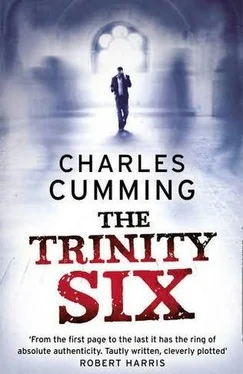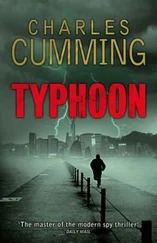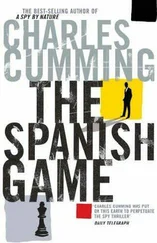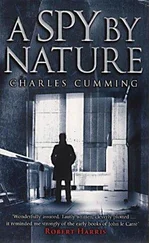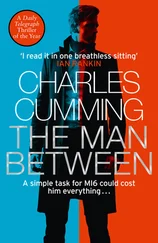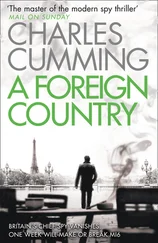Charles Cumming - The Trinity Six
Здесь есть возможность читать онлайн «Charles Cumming - The Trinity Six» — ознакомительный отрывок электронной книги совершенно бесплатно, а после прочтения отрывка купить полную версию. В некоторых случаях можно слушать аудио, скачать через торрент в формате fb2 и присутствует краткое содержание. Жанр: Шпионский детектив, на английском языке. Описание произведения, (предисловие) а так же отзывы посетителей доступны на портале библиотеки ЛибКат.
- Название:The Trinity Six
- Автор:
- Жанр:
- Год:неизвестен
- ISBN:нет данных
- Рейтинг книги:5 / 5. Голосов: 1
-
Избранное:Добавить в избранное
- Отзывы:
-
Ваша оценка:
- 100
- 1
- 2
- 3
- 4
- 5
The Trinity Six: краткое содержание, описание и аннотация
Предлагаем к чтению аннотацию, описание, краткое содержание или предисловие (зависит от того, что написал сам автор книги «The Trinity Six»). Если вы не нашли необходимую информацию о книге — напишите в комментариях, мы постараемся отыскать её.
The Trinity Six — читать онлайн ознакомительный отрывок
Ниже представлен текст книги, разбитый по страницам. Система сохранения места последней прочитанной страницы, позволяет с удобством читать онлайн бесплатно книгу «The Trinity Six», без необходимости каждый раз заново искать на чём Вы остановились. Поставьте закладку, и сможете в любой момент перейти на страницу, на которой закончили чтение.
Интервал:
Закладка:
He drained the beer, took Paul’s house keys from the kitchen table and headed towards the front door. He would buy a packet of Camels, his usual brand, on Hampstead High Street and, when they were finished, quit for good. No point in spending a tortuous day in Charlotte’s house without the back-up of tobacco. It was counter-productive.
As he was opening the front door, jingling a lighter against the loose change in his pocket, a gust of wind shot into the house, sending junk mail scattering down the corridor. Gaddis spotted one of Charlotte’s handbags on a hook behind the door. He closed the door, took the bag down and freed the brass catch. Her purse was inside, bulging with credit cards and cash. He took the purse out and held it in his hand. Of all the objects which had belonged to Charlotte that he had touched that day, this was the one to trigger his grief. A hoop of sadness came up through his body and he had to stop for a moment to compose himself. There was?120 in cash in the purse, as well as a Press ID card and several more receipts. He wondered if the credit cards had been cancelled. Should he do that himself and save Paul the trouble? Visible behind a plastic cover, perhaps so that Charlotte could press the purse against a ticket machine without the need to take it out, was an Oyster card. Thanks to the common room ravings of a colleague at UCL who was obsessed, to the point of paranoia, by the ‘surveillance society’, Gaddis knew that it was possible to go to any Tube station in London and to see a computer listing for the last ten journeys undertaken by Oyster. That gave him a plan. If he could discover where Charlotte had travelled in the last few days of her life, he might be able to match that information to details on her phone bills or expenses receipts. This would at least provide him with the possibility of a link to Thomas Neame.
At Hampstead station he queued behind a backpacking German tourist and placed the Oyster on a reader at the ticket machine. What he saw intrigued him. The same five journeys, there and back, over a period of fifteen days, from Finchley Road station, which was a fifteen-minute walk from Charlotte’s house, to Rickmansworth, in the suburbs of northwest London. He found a Tube map and traced the simple journey north on the Metropolitan line. It would have taken about forty minutes. For some reason, this small triumph of amateur detection was enough to persuade him not to buy the cigarettes and Gaddis returned to the house with a renewed sense of purpose.
He took the receipts from the envelope a second time, pouring them on to the kitchen table: WH Smith’s, Daunt Books, Transport for London. Some writing caught his eye: scrawled on the back of two receipts which were from the same pub in Chorleywood, Charlotte had written: Lunch C Somers. The dates matched the days on which she had travelled north from Finchley. Gaddis knew that Chorleywood and Rickmansworth were no more than a couple of miles apart. He went back outside and returned to the computer, running a search for the name ‘Somers’. Nothing came up. Just the same black hole of false leads and dead ends which had wiped out his morning.
Perhaps she had made telephone calls to a landline in the Rickmansworth area? Gaddis typed ‘Dialling code for Rickmansworth’ into Google and wrote down the number: 01923. The same prefix was listed for Chorleywood. He then checked the results against an itemized phone bill which he had discovered while drinking a cup of coffee at her desk almost five hours earlier. Sure enough, in the three weeks of her journeys from Finchley, Charlotte had made half a dozen calls to the same 01923 number. Gaddis took his own phone from the pocket of his coat and dialled it.
A woman answered, bored to the point of despair.
‘Mount Vernon Hospital.’
Gaddis said ‘Hello?’ because he was unsure precisely what she had said and wanted it repeated.
‘ Yes,’ she said, sounding impatient. ‘Mount Vernon Hospital.’
He scribbled the name down. ‘Please. Yes. I’m looking for a patient of yours. Thomas Neame. Would it be possible to speak to him?’
The line went dead. Gaddis assumed that he was being connected to a separate part of the hospital. If Neame answered, what the hell was he going to say? He hadn’t thought things through. He couldn’t even be sure that the old man would know what had happened to Charlotte. He would have to tell him about her heart attack and then somehow explain his interest in Edward Crane.
‘Sir?’ It was the receptionist again. Her tone was fractionally less hostile. ‘We don’t have a patient of that name here.’
There didn’t seem to be any future in asking to check the spelling of ‘Neame’. Nor could he enquire about Somers. The receptionist might smell a rat. Instead Gaddis thanked her, hung up and called Paul at work.
‘Do you have a relative who works at the Mount Vernon Hospital in Rickmansworth?’
‘Come again?’
‘Rickmansworth. Chorleywood. Hertfordshire suburbs.’
‘Never been there in my life.’
‘What about Charlotte? Could she have had a relative up there or a friend that she was visiting?’
‘Not to my knowledge.’
Somers was obviously the key. But was he a patient at the hospital or a member of staff? Gaddis redialled Mount Vernon using the phone in the house and was put through to a different receptionist.
‘Could I speak to Doctor Somers please?’
‘ Doctor Somers?’
It was the wrong call. Somers was a patient, a porter, a nurse.
‘Sorry…’
‘You mean Calvin?’
The Christian name was a lucky break. ‘Yes.’
‘Calvin’s not a doctor.’
‘Of course not. Did I say that? I wasn’t concentr-’
‘He’s a Senior Nurse in Michael Sobel.’ Gaddis scrawled down Michael Sobel. ‘He’s not due back on shift until the morning. Is there anything else? Would you like to leave a message for him?’
‘No, no message.’
Gaddis replaced the receiver. He pulled up Google on Charlotte’s computer. Michael Sobel was the name of a new cancer treatment centre at the Mount Vernon. He would go there in the morning. If he could find Somers on shift, he might be able to find out why Charlotte Berg kept taking him out to lunch in the days leading up to her death. That information, at the very least, would take him a step closer to Edward Crane.
Chapter 8
The Mount Vernon Hospital was only half an hour by car from Gaddis’s house in west London, but he took the Tube in order to recreate, largely for sentimental reasons, the journey on the Metropolitan line which Charlotte had taken from Finchley Road to Rickmansworth in the last week of her life.
These were the suburbs of his childhood, red-brick, post-war houses of indistinct character with gardens just large enough to play a game of Swingball or French cricket. Gaddis remembered his racquet-wielding father launching a tennis ball into near-orbit one hot summer afternoon, a yellow dot disappearing towards the sun. The train passed through Harrow, Pinner, Northwood Hills, the indifferent streets and parks of outer London, starved of sunlight. The hospital itself, far from being the gleaming twenty-first-century new-build of Gaddis’s imagination, was a vaguely sinister, neo-Gothic mansion with a gabled roof and views across the Hertfordshire countryside. It looked like the sort of place that a soldier might have gone to recuperate in the aftermath of World War II; he could picture starchy nurses attending to men in wheel-chairs, veterans and their visitors spread out across the spacious lawn like guests at a garden party.
Gaddis had taken a taxi from Rickmansworth station and was deposited at the hospital’s main reception, located in a modern building a few hundred metres east of the mansion. He followed the signs to the Michael Sobel Centre and drifted around the ground floor until a female doctor, no older than most of his students, saw that Gaddis was lost, offered him an accommodating smile and asked if she could ‘help in any way’.
Читать дальшеИнтервал:
Закладка:
Похожие книги на «The Trinity Six»
Представляем Вашему вниманию похожие книги на «The Trinity Six» списком для выбора. Мы отобрали схожую по названию и смыслу литературу в надежде предоставить читателям больше вариантов отыскать новые, интересные, ещё непрочитанные произведения.
Обсуждение, отзывы о книге «The Trinity Six» и просто собственные мнения читателей. Оставьте ваши комментарии, напишите, что Вы думаете о произведении, его смысле или главных героях. Укажите что конкретно понравилось, а что нет, и почему Вы так считаете.
